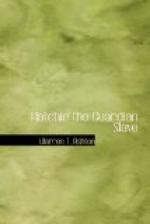“No, never, not the slightest,” said Emily, wiping away the tears which had gathered on her cheeks.
“See if you cannot call to mind some slight circumstance, which you can now recognize as such.”
Emily reflected a few moments, and then replied that she could not.
“And your house-servants are all too young to remember as long ago as your birth?”
“All but Hatchie.”
“Perhaps you had better send for him, and I will question him.
“I will, and I pray that his knowledge may favor me.”
Emily sent one of the maids for Hatchie; but she returned in a few moments, accompanied by Jaspar, who, hearing her inquiries for the man his rifle-ball had sent to the other world, had come to prevent any injurious surmises.
This man, Hatchie, had not escaped Jaspar’s attention, in the maturing of his plot; but, as in some other of the particulars, he had trusted to the facilities of the moment for the means of silencing him. Being a man, it was not probable he could know much of the events attending the birth of Emily to his prejudice. If it should prove that he did, why, it was an easy thing to get rid of him. His rifle-ball or the slave-market were always available. But Jaspar’s good fortune had smiled upon him, and he felt peculiarly happy, at this moment, in the reflection that he was out of the way, for he doubted not the object of Emily in sending for him.
“Miss Emily,” said Jaspar, in a tone of unwonted softness, “I am sorry to say that your father’s favorite servant met with a sad mishap last night, of which I intended to have informed you before, but have not had an opportunity.”
Emily’s cheek again blanched, as she saw all hope in this quarter cut off.
“Poor Hatchie!” said she, as calmly as her excited feelings would permit. “What was it, Uncle Jaspar?”
Jaspar’s lip curled a little at the weakness which could feel for a slave, and he commenced the narrative he had concocted to account for the disappearance of Hatchie.
“About eleven o’clock last night,” said he, “as I was about to retire, I heard a slight noise, which appeared to proceed from the library. Knowing that you would not be there at that hour, I at once suspected that the river-thieves, who have grown so bold of late, had broken into the house. I seized my rifle, and when I opened the door the thief sprung out at the open window. I pursued him down the shell-road to the river; upon reaching which I perceived him paddling a canoe towards the opposite shore. I fired. A splash in the water followed the discharge. The canoe came ashore a short distance below, but the man was either killed by the ball or drowned. In the canoe I found a bundle of valuables, which had been stolen from the library,—among them your father’s watch.”
“But was this Hatchie? Are you quite sure it was Hatchie?” asked Emily, with much anxiety; for she felt keenly the loss of her slave-friend.




